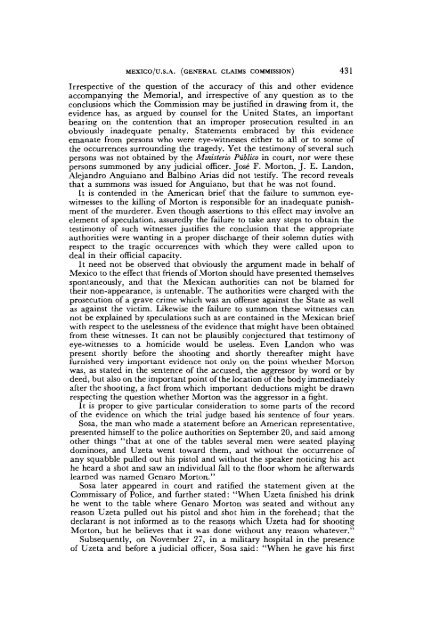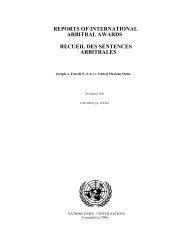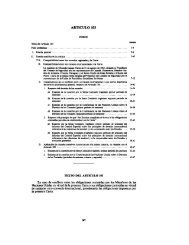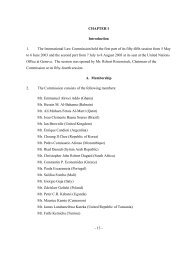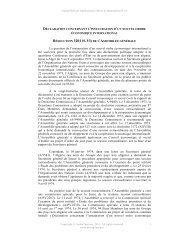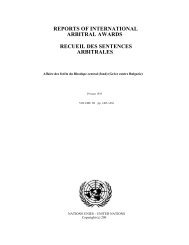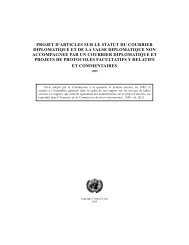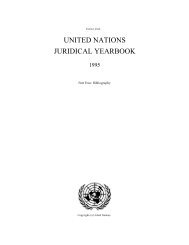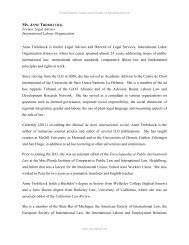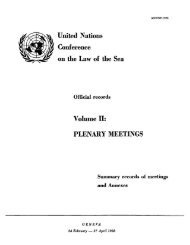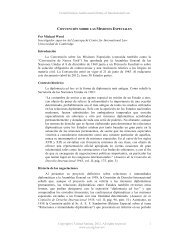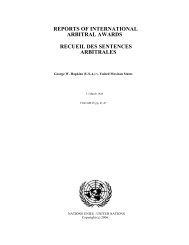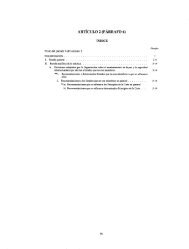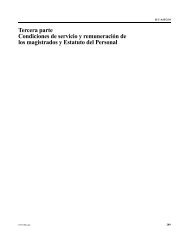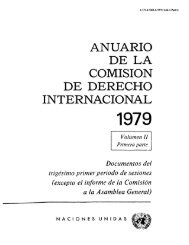428-435 - United Nations Treaty Collection
428-435 - United Nations Treaty Collection
428-435 - United Nations Treaty Collection
You also want an ePaper? Increase the reach of your titles
YUMPU automatically turns print PDFs into web optimized ePapers that Google loves.
MEXICO/U.S.A. (GENERAL CLAIMS COMMISSION) 431<br />
Irrespective of the question of the accuracy of this and other evidence<br />
accompanying the Memorial, and irrespective of any question as to the<br />
conclusions which the Commission may be justified in drawing from it, the<br />
evidence has, as argued by counsel for the <strong>United</strong> States, an important<br />
bearing on the contention that an improper prosecution resulted in an<br />
obviously inadequate penalty. Statements embraced by this evidence<br />
emanate from persons who were eye-witnesses either to all or to some of<br />
the occurrences surrounding the tragedy. Yet the testimony of several such<br />
persons was not obtained by the Ministerio Pûblico in court, nor were these<br />
persons summoned by any judicial officer. José F. Morton, J. E. Landon,<br />
Alejandro Anguiano and Balbino Arias did not testify. The record reveals<br />
that a summons was issued for Anguiano, but that he was not found.<br />
It is contended in the American brief that the failure to summon eyewitnesses<br />
to the killing of Morton is responsible for an inadequate punishment<br />
of the murderer. Even though assertions to this effect may involve an<br />
element of speculation, assuredly the failure to take any steps to obtain the<br />
testimony of such witnesses justifies the conclusion that the appropriate<br />
authorities were wanting in a proper discharge of their solemn duties with<br />
respect to the tragic occurrences with which they were called upon to<br />
deal in their official capacity.<br />
It need not be observed that obviously the argument made in behalf of<br />
Mexico to the effect that friends of Morton should have presented themselves<br />
spontaneously, and that the Mexican authorities can not be blamed for<br />
their non-appearance, is untenable. The authorities were charged with the<br />
prosecution of a grave crime which was an offense against the State as well<br />
as against the victim. Likewise the failure to summon these witnesses can<br />
not be explained by speculations such as are contained in the Mexican brief<br />
with respect to the uselessness of the evidence that might have been obtained<br />
from these witnesses. It can not be plausibly conjectured that testimony of<br />
eye-witnesses to a homicide would be useless. Even Landon who was<br />
present shortly before the shooting and shortly thereafter might have<br />
furnished very important evidence not only on the point whether Morton<br />
was, as stated in the sentence of the accused, the aggressor by word or by<br />
deed, but also on the important point of the location of the body immediately<br />
after the shooting, a fact from which important deductions might be drawn<br />
respecting the question whether Morton was the aggressor in a fight.<br />
It is proper to give particular consideration to some parts of the record<br />
of the evidence on which the trial judge based his sentence of four years.<br />
Sosa, the man who made a statement before an American representative,<br />
presented himself to the police authorities on September 20, and said among<br />
other things "that at one of the tables several men were seated playing<br />
dominoes, and Uzeta went toward them, and without the occurrence of<br />
any squabble pulled out his pistol and without the speaker noticing his act<br />
he heard a shot and saw an individual fall to the floor whom he afterwards<br />
learned was named Genaro Morton."<br />
Sosa later appeared in court and ratified the statement given at the<br />
Commissary of Police, and further stated: "When Uzeta finished his drink<br />
he went to the table where Genaro Morton was seated and without any<br />
reason Uzeta pulled out his pistol and shot him in the forehead; that the<br />
declarant is not informed as to the reasons which Uzeta had for shooting<br />
Morton, but he believes that it was done without any reason whatever."<br />
Subsequently, on November 27, in a military hospital in the presence<br />
of Uzeta and before a judicial officer, Sosa said: "When he gave his first


